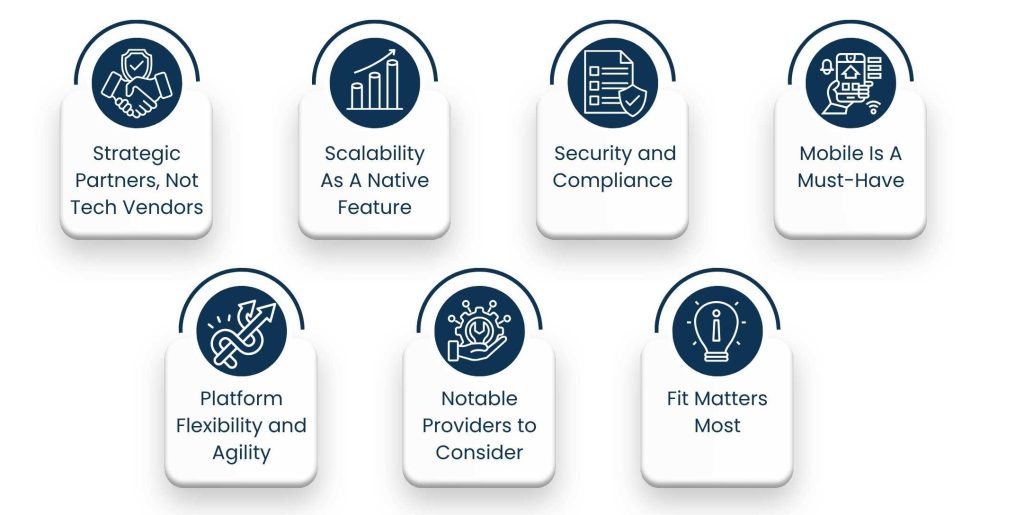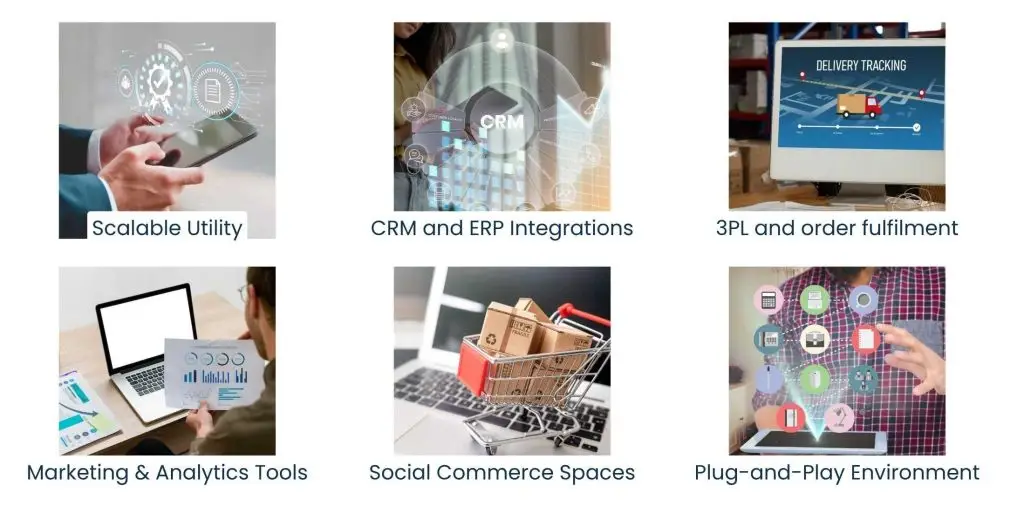Introduction
B2C eCommerce platform solutions are more than just backend systems and should be for your successful online retailing in a digital-first economy. The platform you select will have a direct bearing on how effective your store is at acquiring, converting, and retaining customers. It is the space where performance, experience, and growth opportunity intersect.
Whether you’re a start-up establishing an online presence or one of many high-volume businesses scaling your platform to accommodate a good amount of orders, a mature platform caters to complex customer journeys, quick checkouts, and expanding demand. Product discovery and post-sale communication rely on the speed of your infrastructure.
These days, shoppers browse on their smartphones for shopping, so brands need a strong B2C eCommerce platform that runs on mobile effectively. Any hitch can turn off potential buyers.
Picking the best B2C eCommerce platform isn’t about features; it’s about setting yourself up for growth. Your system should help you grow faster with confidence, while supporting your strategic approach. When your tech stack supports the capabilities, you accomplish innovation and growth easily.
How to Provide a Good eCommerce Platform for Consumers?

To create a profitable online shop, it is necessary that your platform:
1. Manage heavy traffic seamlessly:
As your business grows, your solution grows with you without slowing down. Downtime or slowness can translate to lost sales and trust from our customers. Find a solution with robust hosting, network, CDN integration, and uptime SLAs. Scalable performance should not be up for debate.
2. Enable seamless mobile shopping:
The user receives the same experience on all of their devices with a responsive design. But beneath the hood is where you need to count; any successful ecommerce platform will need to be able to support one-click checkout, mobile wallets, and real-time inventory adjustments. Can mobile UX with no friction = more conversions and repeat business?
3. Marketing, SEO, and customer engagement support:
Built-in SEO features, where clean URLs, meta tagging, and blog support enhance discoverability. Email automation and abandoned cart recovery, and promotion features grow sales and customers. Marketing instruments should be easy to use and powerful.
4. Sync with payment gateways, CRMs, and fulfillment partners:
Your platform should be able to sync with major tools in your tech stack. Real-time paye processing, synced customer profiles, and automatic shipping are also there to make business easier.
5. Flex in product, pricing, and promotions:
Flexibility is important in business strategy. You require the capability to execute pricing and promotional strategies to deliver value to your customers.
A Scalable B2C shopping cart solution helps businesses adapt quickly to market trends, scaling of product lines, and entry into new markets and territories without requiring system reconstruction. It is intended to be a long-term growth partner for your brand, not a short-term patch.
Also Read: Web3 Marketing Assistant
Why is scalability important at an eStore?
Scalable infrastructure enables companies to efficiently accommodate rapid growth and avoid bottlenecks that obstruct their progress and frustrate customers. Stable platform: A platform that doesn’t crash and burn just when your traffic spikes will keep you from crashing and burning too, and will give your team the confidence to act during high-traffic times. Downtime, during a product launch or holiday season, is a fast track to eroding trust and sending customers to competitors in droves.

A scalable B2C eCommerce site that delivers excellent speed across all touchpoints in the customer journey: browsing content to the account, to content, checkout, account management, shipping updates, and post-sale support. Scalability also means you can quickly experiment with new features, designs, or business models. You can test your changes and push them out fear-free.
Scale is also operational nimbleness for emerging brands. Companies can roll out into new markets, introduce new product SKUs, or run flash sales with minimal IT participation. They can also integrate all of your fancy marketing, CRM, and analytics tools that you use to eek out an existence in the ever-changing digital world.
And, enabling you to deliver a great experience to your customers even under stress, thanks to scalability. Whether it’s an overnight influencer-fueled traffic spike or a planned international expansion, the right platform will adjust immediately to help you grow and reach new markets, no matter what your demands are.
Whether it’s through flash sales or international expansion, the right platform should scale with you. It’s an asset, not simply a technical necessity, and gets your business ahead, and keeps you ahead, in the content-turbulent universe of eCommerce.
Selecting the Best B2C eCommerce Platform Providers

1. Strategic Partners, Not Tech Vendors:
The best B2C eCommerce platforms do more than provide templates and hosting. They provide companies with analytics dashboards, automation platforms, omnichannel solutions, and engagement platforms. These are the characteristics that make them partners for long-term growth, not just software arbitrators.
2. Scalability As A Native Feature:
A direct-to-consumer eCommerce platform that grows with your business is paramount. Your platform should require little reconfiguration as you scale from hundreds to thousands of transactions or move into international markets. Pick one that scales well.
3. Security and Compliance:
Top services focus on PCI compliance, encryption, and staying up to date. Security isn’t optional – it’s a necessary measure to safeguard consumer data, maintain trust in the face of your brand, and stay compliant in the world of digital commerce as laws change.
4. Mobile Is A Must-Have:
Making sure your B2C ecommerce platform is mobile-optimized has become a de facto requirement: Think responsive templates, mobile-first checkout, and seamless integration with mobile wallets. As the majority of consumers are using their smartphones to buy, poor mobile UX can take sales and ruin your reputation.
5. Platform Flexibility and Agility:
Your eCommerce platform should be able to support multiple sales models, whether that’s a subscription model or a flash sale one, or even something as complex as a hybridized B2B/B2C model. This kind of flexibility is what makes the B2C eCommerce platform scalable even years down the line.
6. Notable Providers to Consider:
Shopify is known for ease of use and third-party apps. BigCommerce stands out for its built-in features and API support. Magento can provide extended customization for large enterprises, Squarespace and WooCommerce do well in the smaller, niche space.
7. Fit Matters Most:
Match the provider to your team’s skill level, your business goals, and the customer experience you want to provide. An excellent consumer eCommerce platform shouldn’t fight complexity, but amplify it for innovation.
The Bottom Line: The eCommerce platform should manage scale, security, and back-end performance, while you do marketing, loyalty, and growth.
The Influence of Mobile Shopping on B2C E-commerce

1. Mobile Ascendant as Shopping Channel:
Mobile is the new king of online shopping. Most everybody shops and buys on their smartphones. In this regard, B2C online platforms need to adopt a mobile first strategy. Scaling the desktop experience is not enough; platforms need to be designed for frictionless, hand-holding, and fast interactions on the small screen.
2. A Better User Experience:
It’s not only about responsive design but user experience. Mobile shoppers want one-handed navigation, auto-filled forms, and tap-friendly buttons. A robust mobile B2C eCommerce platform offers lightning-quick checkout flows, which help to ensure carts are not left abandoned.
3. Speed and Performance Matter:
Load times do matter on mobile. When it comes to this setup, a few seconds can make a difference in terms of conversions. You can also use platforms that utilize CDNs that have compressed mobile resources, which can help decrease loading times with high traffic volumes. A faster website provides your visitors with a better experience, helping you to increase both your search engine rankings and revenue.
4. In-Built Mobile Payment Methods:
Including these payment types can significantly boost conversion. A mobile-first app supports all popular mobile payment gateways by default.
5. Why Mobile Intelligence is Trending Higher Than Mobile Friendly:
With consumer behavior looking more and more to mobile-first browsing and buying, it pays off for brands to opt for platforms that are mobile-friendly and, at the risk of being repetitive, mobile-intelligent. These platforms predict and prescribe user behavior, customize mobile experiences, and provide analytics devoted specifically to mobile engagement, everything you need to tweak and nudge your strategies on the go!
Integration That Will Help You Grow

1. Scalable Utility:
The scalable consumer-facing eCommerce platform is as good as the extent to which it integrates with a variety of utility tools. Thanks to these integrations, you keep your whole business, marketing, sales, customer service, and fulfillment aligned and in unison. The scaling is interrupted haphazardly without smooth transitions, and it means it can be postponed and wrong with that.
2. CRM and ERP Integrations:
Platforms should easily connect to CRMs to customize outreach and manage customer data. Real-time inventory management with ERP for products on all sales channels. These ties lead to smooth functioning and better decision-making.
3. 3PL and order fulfilment:
Plug in 3PL, and your orders will automatically be routed and tracking codes updated for your shipping, alongside auto-updating inventory. It also minimizes workload, maximizes volume of delivery, and improves user experience.
4. Marketing & Analytics Tools:
Automated engagement triggers, email advertising tools (examples include Klaviyo, Mailchimp), and analytics dashboards (examples include Google Analytics, Hotjar) automate engagement and tracking. These small connectors assist in ensuring that brands can carry out campaigns on time and make informed decisions.
5. Social Commerce Spaces:
Integrating Facebook and Instagram Shopping enables you to meet your customers where they already hang out. A strong platform helps brands synchronize catalogues.
6. Plug-and-Play Environment:
The cream of the crop in platforms provides a marketplace of apps and extensions you can plug in to without the hassle of building them from the ground up. That agility is a critical need for growth-stage companies, which are turning over their tech stack every quarter.
Conclusion
For customers, a strong B2C ecommerce platform is more than just a way to transact: It’s the center of an entire online presence. From making sure that their site is mobile-friendly to how well their product integrates with your others and their out-of-the-box authority to scale as you grow, the platform you use will end up determining who you can attract, retain, and engage as customers.
And yet, from niche to mass market, it’s always the same story: if you do have a strong and viable basis, it should be a no-brainer to scale up; you won’t be able to scale without it. A B2C eCommerce platform will allow you to tailor the Sales funnel to do so, as trends alter, and pivot as deserved in a timely and efficient manner.
By empowering a mobile-first design, a flexible approach to payments, actionable insights, and a scalable infrastructure, you will ensure growth on a solid foundation. An appropriate platform provider should also be a strategic partner that scales with your business.
In a booming market, having the right tech stack is not optional; it’s essential. Choose a Tasks Expert who not only solves your present problems but also enables your future aspirations. Your growth, flexibility, and customer experience depend on it.
About Us
Tasks Expert offers top-tier virtual assistant services from highly skilled professionals based in India. Our VAs handle a wide range of tasks, from part time personal assistant to specialized services like remote it support services, professional bookkeeping service etc. Furthermore, it helps businesses worldwide streamline operations and boost productivity.
Ready to elevate your business? Book a Call and let Tasks Expert take care of the rest.









